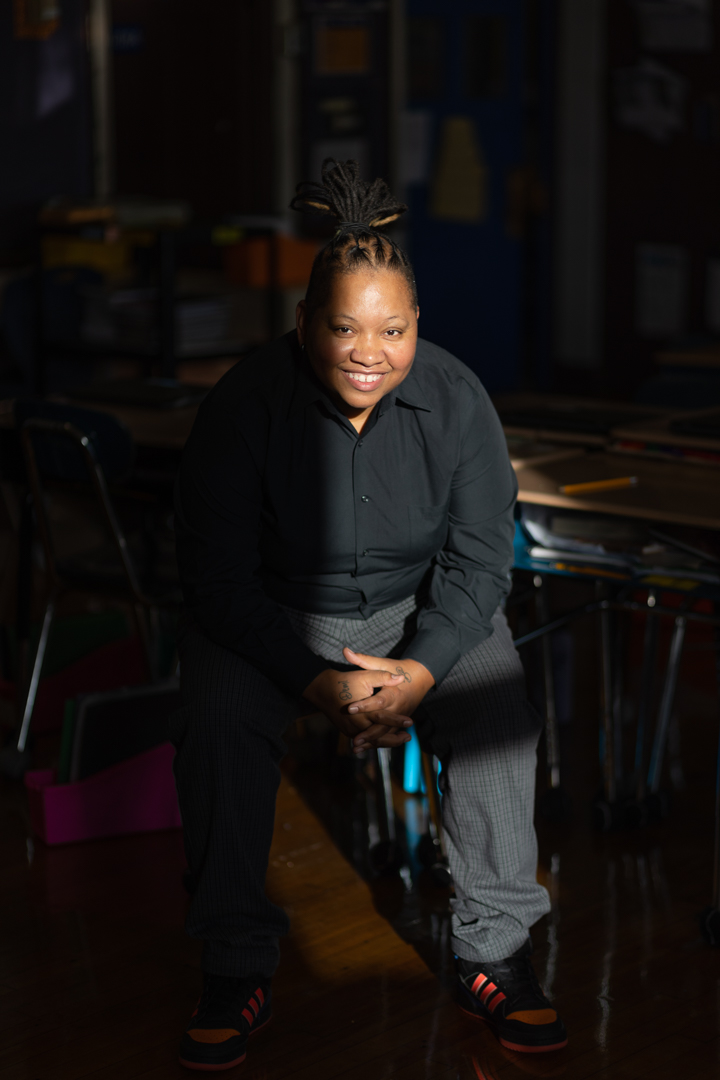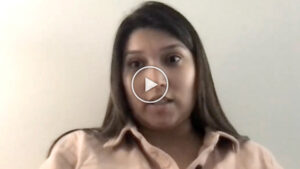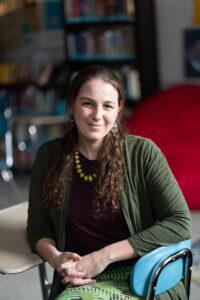I was working at The Bridge Home at St. Mary’s Women and Children’s Center. It’s a shelter for infants to 12-year-olds. If the Department of Child and Family Services pulled a kid from their home, we housed and counseled them.
I started off as an overnight counselor and quickly moved up to daytime supervisor. Some of the kids had to stay at The Bridge Home during the day because they weren’t yet re-enrolled in school after being removed from their homes. So we had to come up with schoolwork and work with them. Sometimes I found myself having to send staff members out to their schools because they were having behavior issues, or maybe we had to go pick them up because they were suspended. I started wondering, ‘What if they had teachers who understood what was happening for them outside of school?’
I was still close with my own fourth grade teacher. And she said to me, ‘Tamika. You’re making limited money. You’re in a burnout job. You know how to manage the kids. I think it might be good if you tried the Boston Teacher Residency. It’s a one-year program, you get your master’s, and you get your teaching license. And then once you’re licensed, you’ve already got the classroom management piece. You can go to professional development to learn the academic piece, but with your experience with kids, you would make a great fit.’
I had been at The Bridge Home for years, but I decided to go into the teacher residency program. I loved it. And I started teaching.
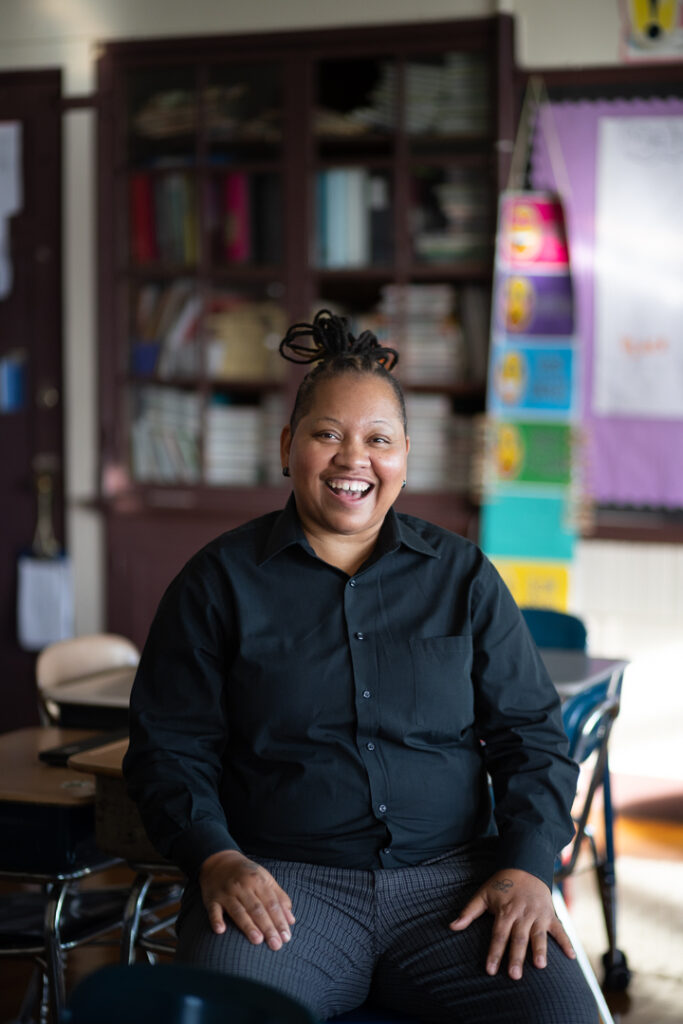
In the Boston Teacher Residency, they paired me with a mentor at the Mather School, Mr. Killilea. He’s still teaching here, 18 years later. We were teaching third grade, and I loved the way I learned from the third graders. At the end of the year, some people from the residency were asked to stay. I was not asked to stay.
I wound up taking a fourth grade position at Orchard Gardens Pilot School, and a lot of people told me, ‘Don’t go there. That’s a tough school.’ And I promise you, that was the best teaching year of my career. I loved my class. We loved each other. I loved their families. I had a paraprofessional who was a teacher’s aide with me. He was kind and supportive, and we worked well together. We had a lot of resources. And I did home visits, so I got to meet with families who had students struggling. I decided to try to get ahead of all of it and build relationships so that when a behavior issue came up, I already knew the family.
I was at Orchard Gardens on a waiver because I was not licensed yet. I hadn’t passed all of the tests. The principal had signed off on a waiver for me for that one year, and then she tried to get me to loop with my class to the fifth grade. I turned it down, because I wanted to stay in fourth grade. And then she didn’t renew my waiver.
I went on to substitute at Russell School around the corner, for the third grade teacher who was out on maternity leave. We had a math coach in the building, and she had an interview where the principal of Mather came to watch her do a lesson. I was there too, supporting classroom management. And when that principal came back here to the Mather building, the teachers who I’d worked with during my residency told her they wanted me back. They were telling her, ‘You have to get Miss Fluker back here! We don’t understand why she wasn’t asked to stay.’
So my friends are texting me, they’re like, ‘Flukey! Did you get your license yet?’ I’m like, ‘Yes, I got it.’ They told me to go online and apply for the position. I didn’t realize it was the same fourth grade position that the math coach had done the demo for. I applied for it, I walked in the building, and I was greeted immediately by everybody. I went into the interview and it was like we’d known each other forever. They knew what I was capable of. And so in the end, I got the job. That’s how I wound up back here.
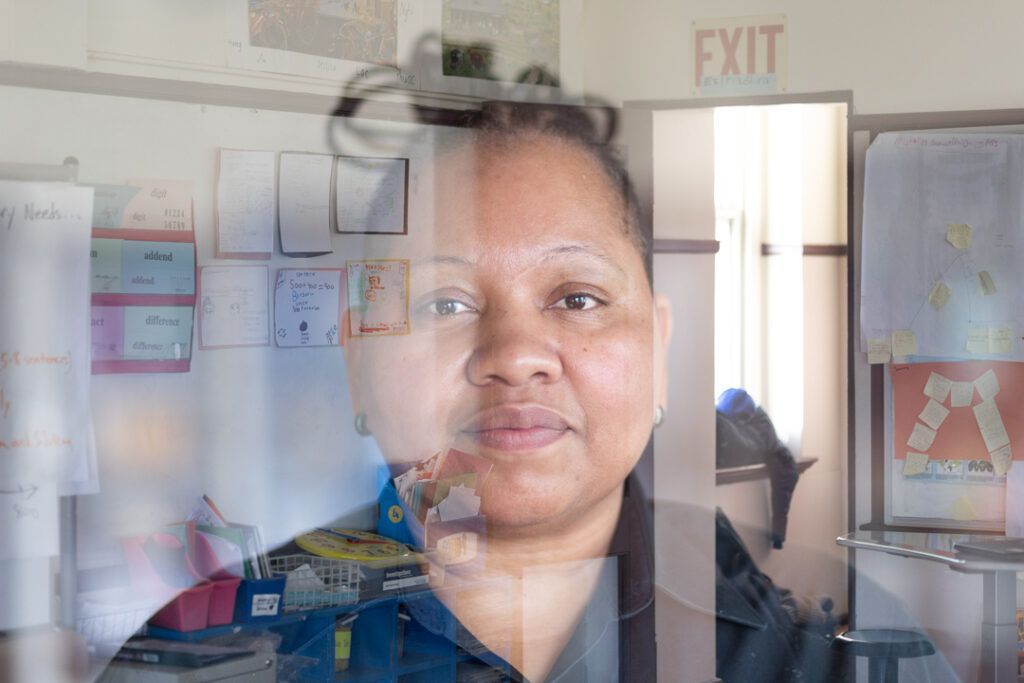
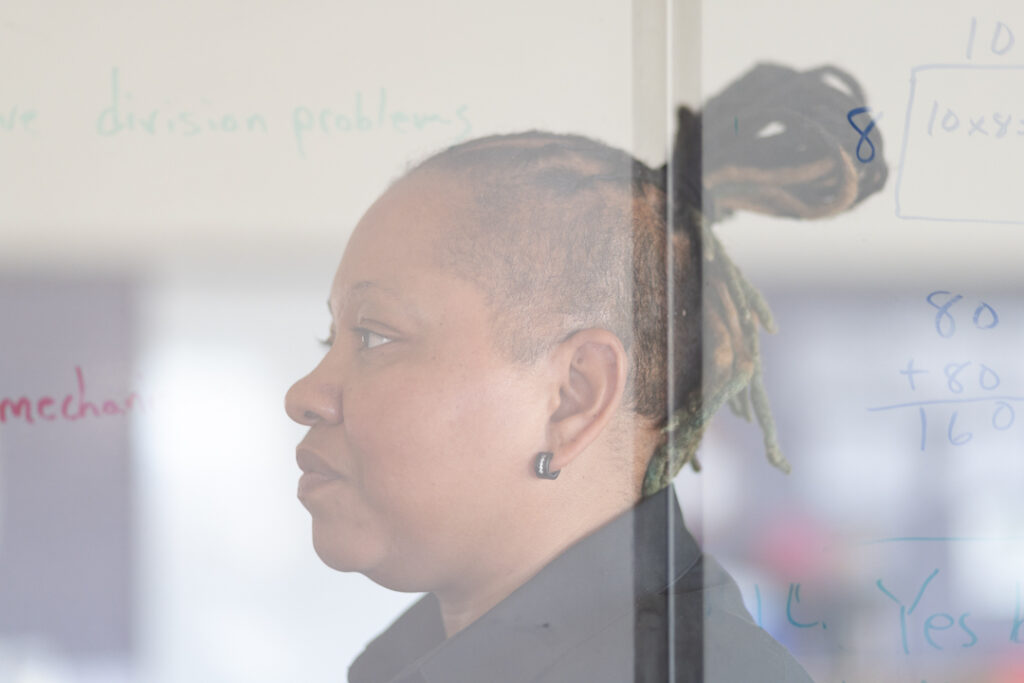
My first year here, I had a group of students who were African American, Hispanic, and Cape Verdean boys. Their home lives were a little rough. Some of them had been exposed to gun violence, some of them had been exposed to gangs, and some of them were exposed to drug dealing. So these were some tough, tough kids. These were boys who would go outside and end up getting in trouble at recess. And then they’d come back up here, and I had to process with them. We spent a lot of time processing and calming them down, and then they’d get back into the groove of work.
We were going over the containment drill and talking about how that looks. We had to go to the rug area, away from the door, away from the windows, pull the shades down… and sit and wait. And these boys, they said, ‘Miss Fluker, what happens if the shooter comes in and they shoot you? Now what are we supposed to do?’ And I’m like, ‘You guys run to the exit. Go to the next classroom. Go through the door.’ They’re like, ‘You want us to leave you?’ And I said, ‘Yes. You have to get out, you’ve got to get out and go to safety.’ They’re like, ‘We’re not leaving you, Miss Fluker!’
They started talking. One of them’s like, ‘I’m gonna grab chairs and start throwing them.’ The other one’s like, ‘I’m dragging you to the other door, to the other classroom!’ The other one’s like, ‘We’re throwing desks! We’re throwing chairs!’
And at that point, I thought: Wow.
They need me.
They need me.
I cannot leave. I have to teach.’
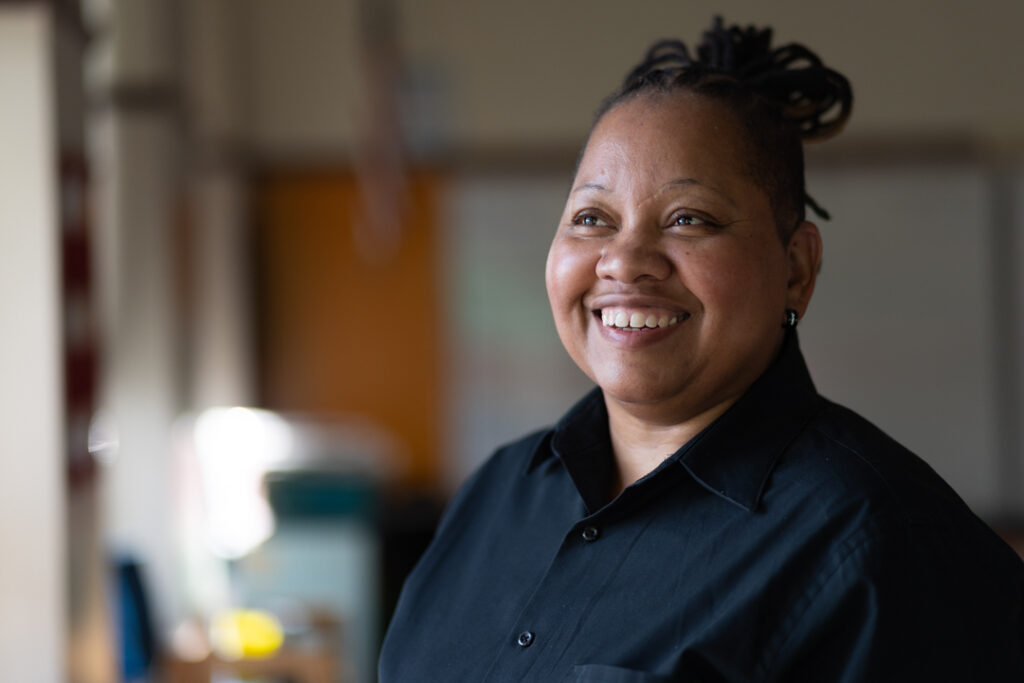
Whoever comes through this room, they need me. I give the kids a sense of confidence and a sense of we-can-do-it enthusiasm.
We’re out here in the neighborhood, and we’re surviving. We come to school every day, and we’ve got to do the school thing, but when we leave school, we have to deal with what’s going on in our community and in our homes. And the children come back with sadness about what’s going on in our community. And we get to talk about it, because I listen a lot.
I listen. I hear them. I give them lifespan interviews. People will laugh because whenever they see me in the hallway with somebody, they know we’re doing some kind of a lifespan interview, because I’m connecting with them and I want them to feel heard.
It’s not just about math, reading, and writing. It’s about this sense of building a community where you feel safe and you feel wanted and you feel like you can learn beyond what test scores show. You can do more with yourself. It’s okay. If you fail, you try again.
I tell them the story all the time about how I didn’t pass the general curriculum exam the first time. Plus the reading assessment that I had to take to get my license, I failed that twice. And then I made sure to take some courses, and I made sure that I spoke with people to get a better understanding of the test. I’m not a good test taker. But I share this with the students. And I share with them how JFK failed his bar exam twice.
I tell them, ‘I’m human. You’re human, too.’
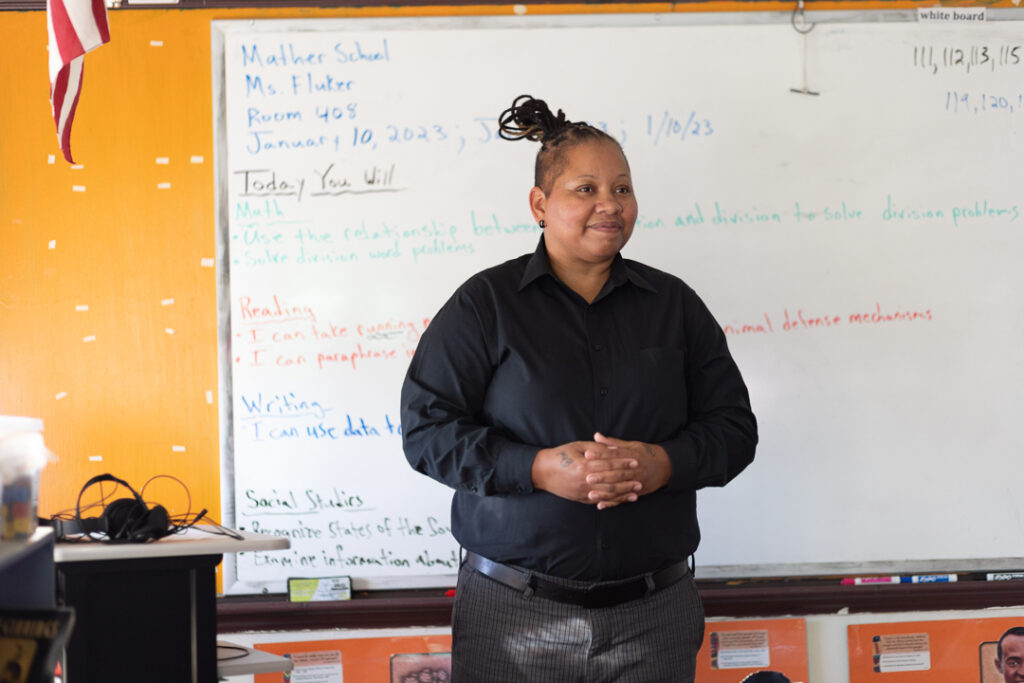
You have to have strength. You have to have a sense of self. You have to have boundaries. Because if you don’t, teaching can eat you up.
I am a nurse. I am a teacher. I am a parent. I am your counselor. I am everybody when I’m here with you. If you cut your finger, if you hurt yourself and say you haven’t, if you have backaches, if you’re not feeling good. I’m feeling your forehead. I’m asking what you ate today. If you come in and look sad, I’m going to step out and check in with you: ‘Are you okay? What’s happening? You don’t look like yourself today.’
I’m your teacher. You say good morning to me. You give me a hug. You have questions about your homework: ‘Ms. Fluker, can you help me with this?’
Yes, I can help. I’m your teacher.
Now you’re having technical difficulties with your Chromebook and you want me to help you fix it, while I’m teaching. And I’m trying, but I’m obligated to watch everybody. I can’t serve everybody in that fashion at once. Then throughout the day, I have people coming in to give me papers. Or I have to check my email — and look, email is like the mailman standing at your mailbox all day long, just dropping in mail. So gosh, if I don’t carve out some time for myself, the demands can be heavy.
It’s a lot, but if we could place more social workers in the building and more interventionists in the building, that would make a big difference. We need more professionals to come in and meet with our kids and our families. If I could ask the general public to do anything, it would be to get us more mental health support and more social workers in the school system.
For things like books and materials we need, we can raise money from people on DonorsChoose. That’s how I got this rug for the kids, and these African American books, and these tennis balls to cover the bottom of the legs of the chairs.
But I can’t do DonorsChoose for a social worker.
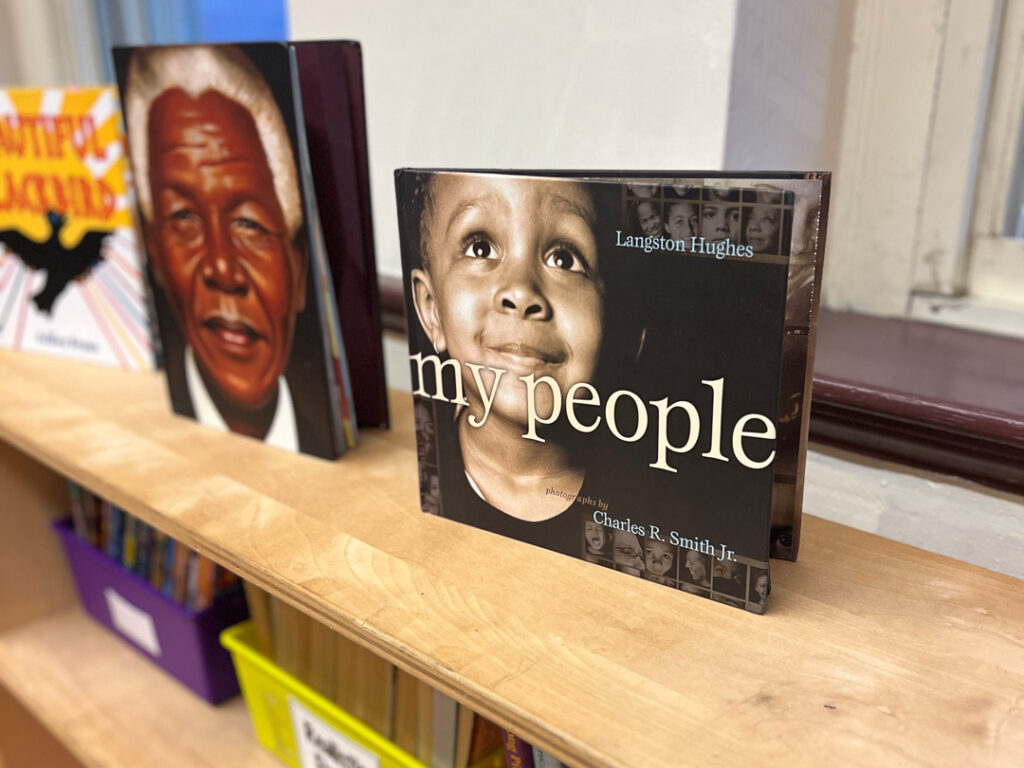
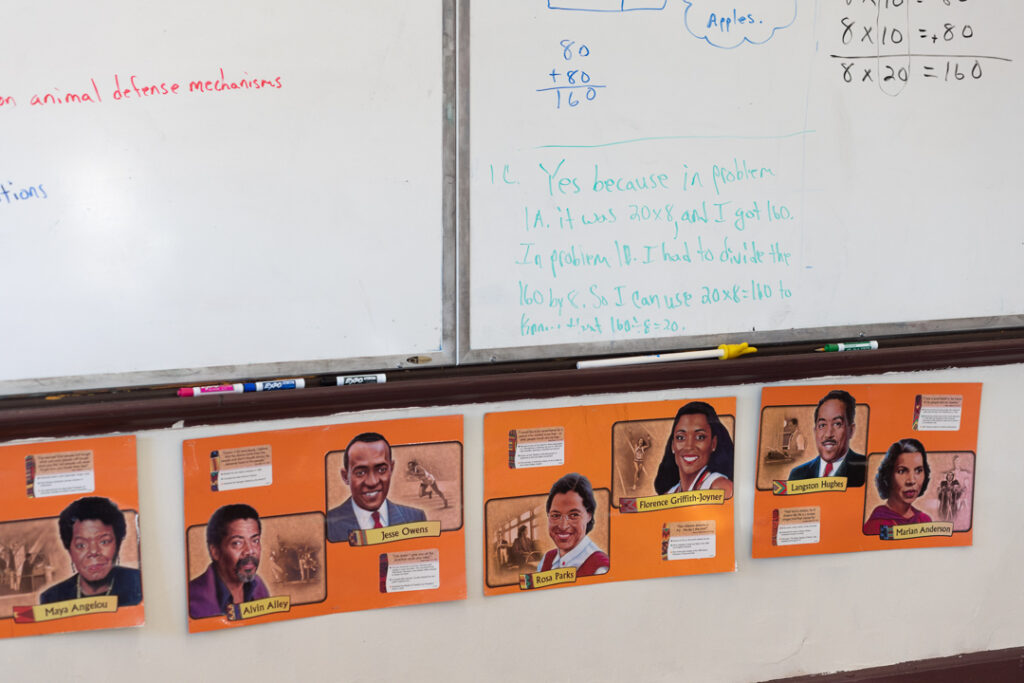
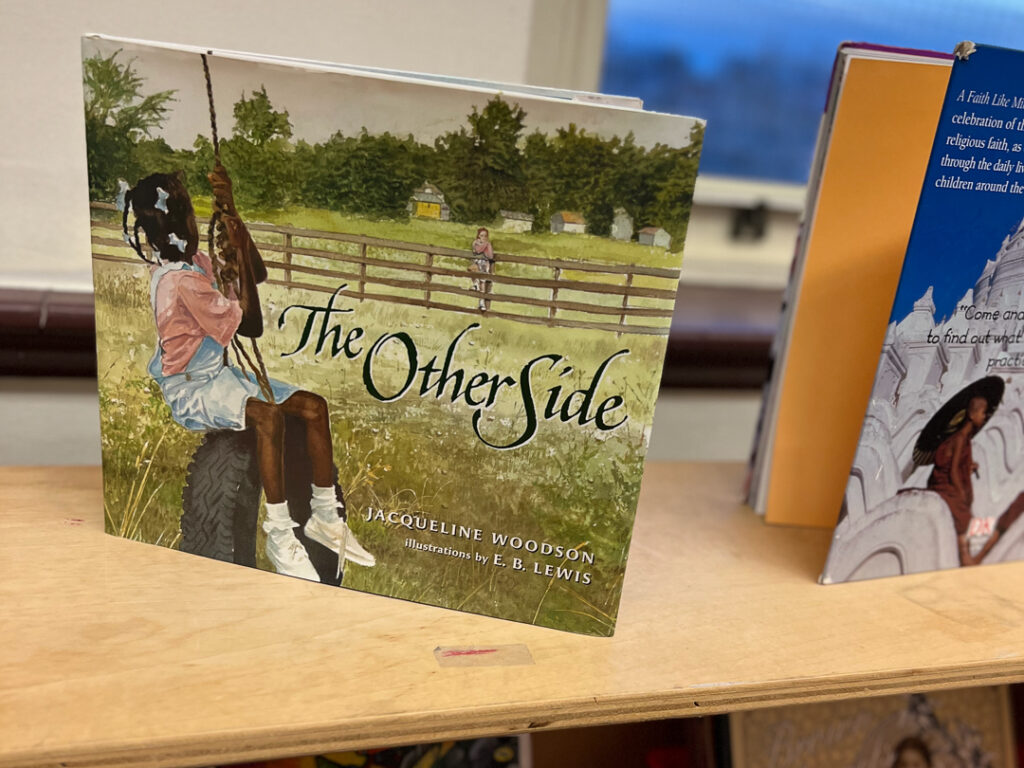
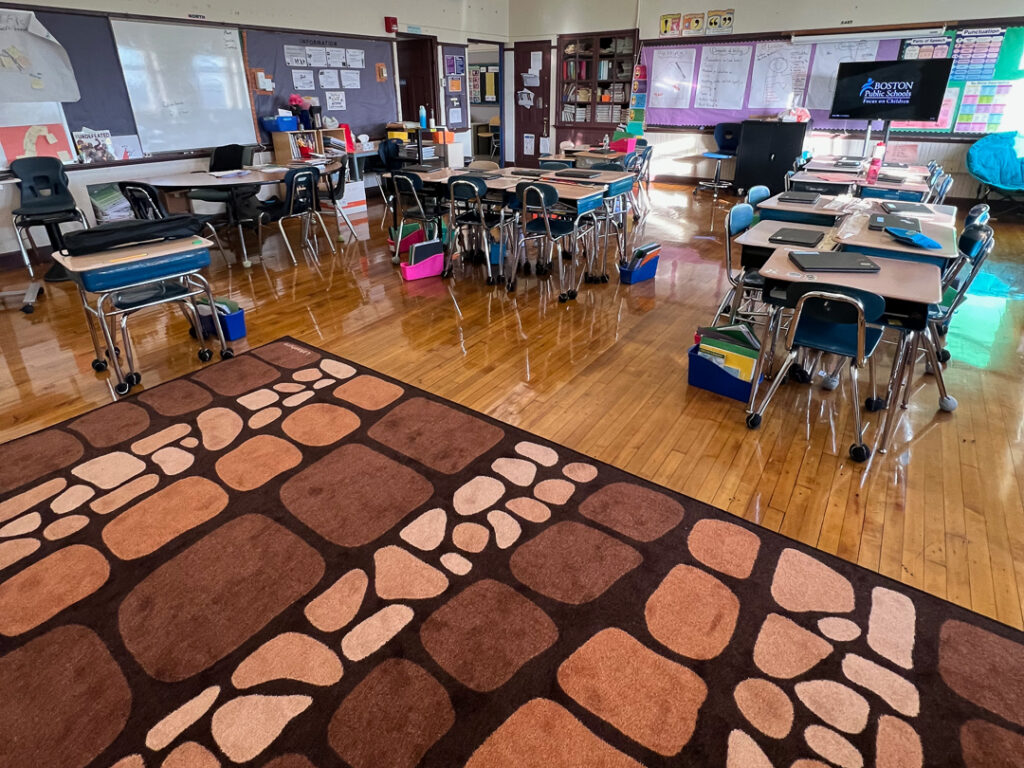
Yes, as teachers, we would like to be paid. Money can play a part in recruiting people and getting people to become teachers. But can it keep them? No. I don’t think so. Because you deal with so much. You need to be committed to educating and you need to love working with children.
You’re dealing with 25 students alone. That’s 25 different personalities. That’s 25 different learning abilities. That’s 25 different families, guardians, whoever they’re living with and whoever’s in charge of them. You’re on demand all day, every day.
When we don’t have the supports that we need for students’ differences, it makes it stressful. And there’s a whole process that you have to take them through in order to get them certain resources. Something as simple as reading intervention: it would be great to have more volunteers who come in and say, ‘Hey, we’ll do intervention with the students.’ Or, ‘I’ll take a couple of your kids three times a week and do interventions with them and record that.’ That would ease up some of what I’m going through.
Or attendance: I need support around kids who are having attendance issues. As a teacher, I have to go into Panorama. I have to type up notes. I have to call their parent, I have to email their parent, I have to text their parent. I have to try to be in touch with the parent to say, ‘Hey, first of all, is everything okay? I notice she’s been out. Can you please send a notice of absence so that we can try to resolve some absences?’ And if those are the extra steps on top of the paperwork for the kids who are struggling with reading, writing, and math, sometimes all of those logistical things — as important as they are — take away from our teaching. Because if you don’t have time to do it here, you take it home. And I think the demands of all of it can scare people.
Sometimes I wish I had an assistant to keep up with my bulletin boards over here. I wish I had an assistant to type in the notes I need for Panorama. I wish I had an assistant to do those, because I just want to teach.
I want to interact with my students.
I want to teach.
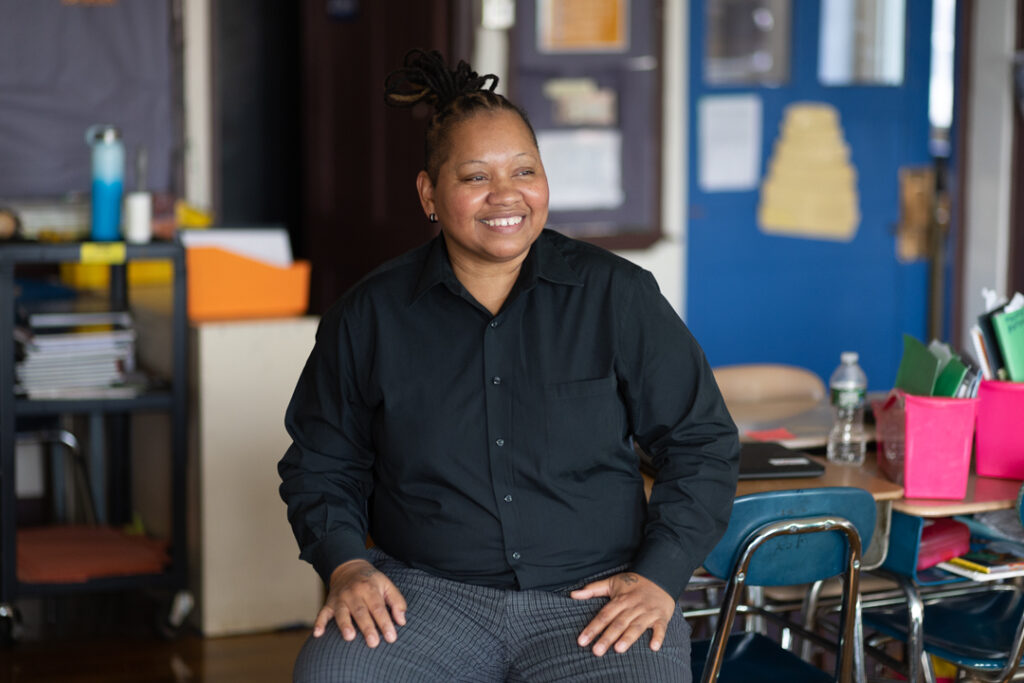
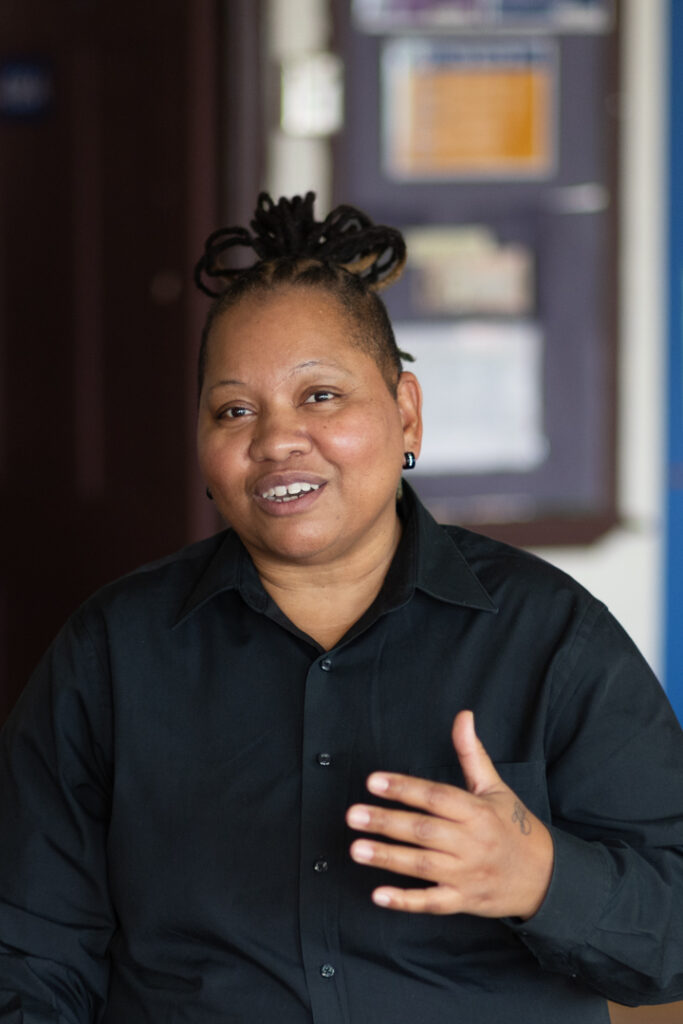
People ask what can help us as teachers. And at some point, we had City Year, which was very helpful. It basically provided us with assistant teachers. And whatever we needed them to do, they were willing to do it.
I had a City Year resident for a school year. Dustin was his name, and he was really great. He built relationships with the students. We don’t have a lot of male teachers, so that was important. Programs like that provide support for us and help young people feel out whether they want to teach or not.
I love that we have Playworks. We have to pay for that, and we’ve been blessed to be able to have them for the last few years. They come and teach the kids how to play in healthy ways: class game time, moving your body, conflict resolution.
We used to have volunteers from different colleges come in at the beginning of the year, when we’re setting up our classrooms and could use the help. That’s always a plus. I’m not sure why they don’t come anymore. The local college students also used to come in and tutor our kids, but then they cut that program.
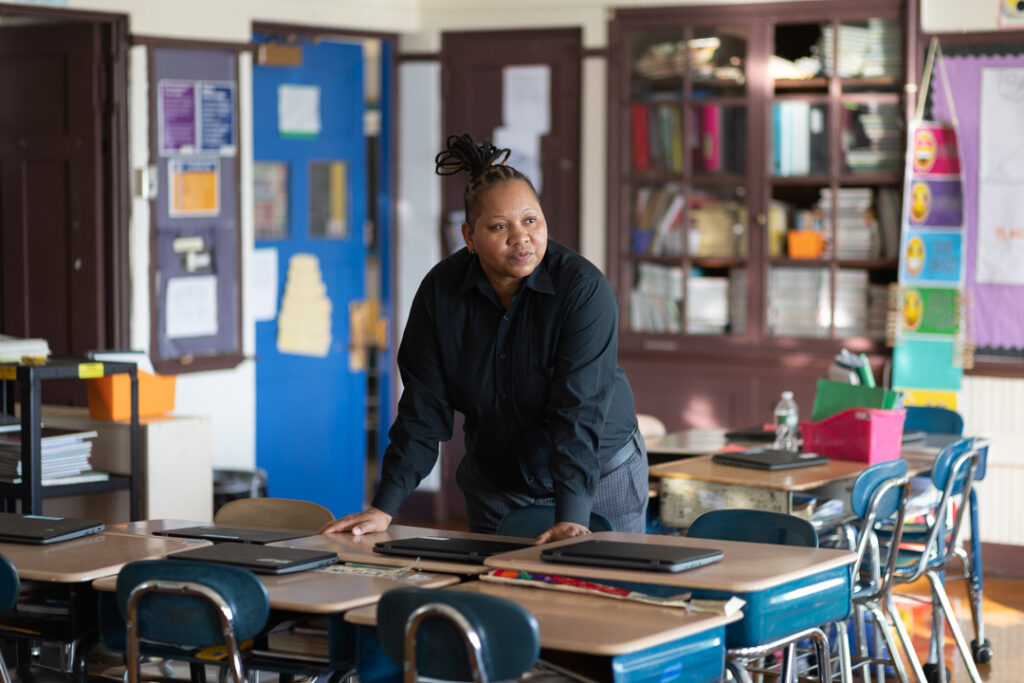
This is the oldest public elementary school in the nation. Established in 1639. We have teachers here who used to go to school here. We teach the grandkids of students who used to go here. And so there are people who can say, ‘I remember what it was like back then. I was the only Black person in the school.’
We have a long-standing history of assemblies that we do, and we put on an African American Heritage assembly every year. That’s a big one. That’s a huge deal. Families come in. The place is packed. The kids put on such a great show, and then we break bread and we eat. We have a big lunch and people are dressed in African garments. And they have this book where they have pictures from years and years of performances.
And while it comes with great things to be such an old school, I’m sure some of those memories weren’t such great experiences. There’s also some not-so-positive parts of the building. For instance, the heating. It was cold last week, and it was snowing, and it was not warm up here. The radiators up here weren’t working.
We don’t have an HVAC system. We don’t have great air quality in the building. We don’t have an elevator for kids or staff with physical disabilities. Sometimes the ceiling falls. I’ll be with the kids and we’ll hear something fall from the ceiling in the closet.
We have to work with what we have and try not to complain on a day-to-day basis. But how can my kids learn if they’re cold? The room that used to be next to me downstairs is freezing. I’m talking about kids wearing hats and gloves in there. Why do our students have to try to learn like that?
They come in from a community that might be a little rough, and they’re coming into school, and they still have to have a rough time.
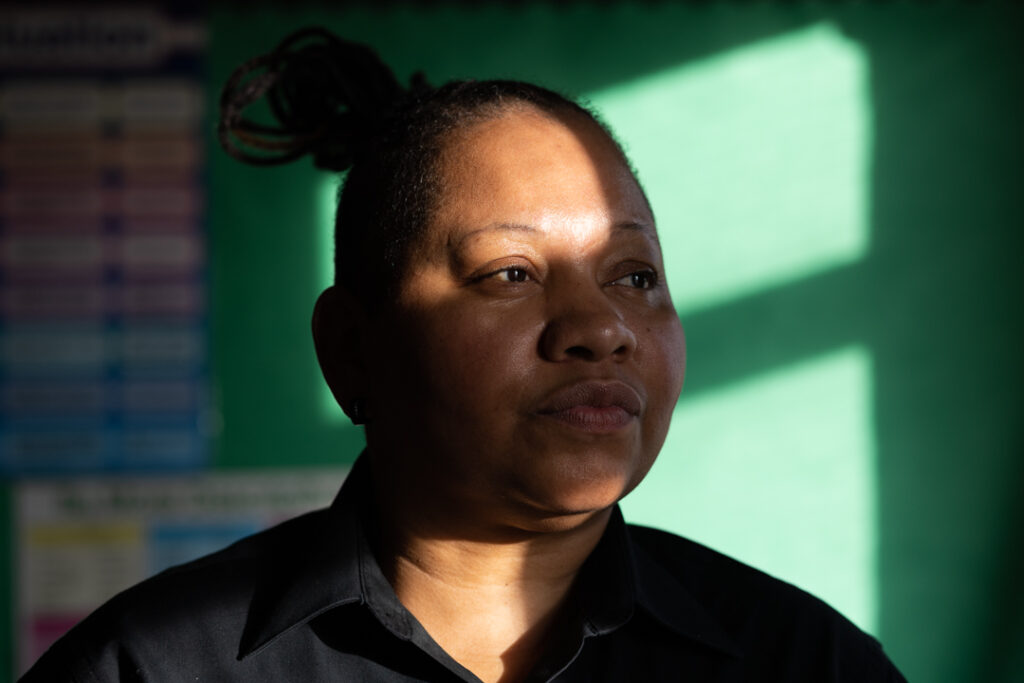
Mental health is a big deal in our community. I had a group last year who could have used a whole class full of social workers. Coming out of COVID and remote learning, there was so much anger and agitation and low self-esteem. And so a majority of my teaching last year had to do with social-emotional learning, because that’s what my class needed. They had a hard time functioning with each other and with adults.
There is a great need for support around mental health in our school community and our greater community. The amount of people that I am interacting with who say that they suffer from depression, or anxiety, or fear — it’s bananas. And there’s a cycle that happens. So if you’re a parent and you’re dealing with depression, homelessness, high anxiety, domestic violence, poverty — you deal with these things, and your kid is going to feel that. And then your kid comes to school, and they bring that feeling with them.
We need greater support around that. More funding for social workers and mental health professionals.
If we can take the kids out of the building for more field trips and give them authentic experiences, that helps their mental health too. Why do I have to go on DonorsChoose to raise money to get bus transportation to take my kids on a field trip?
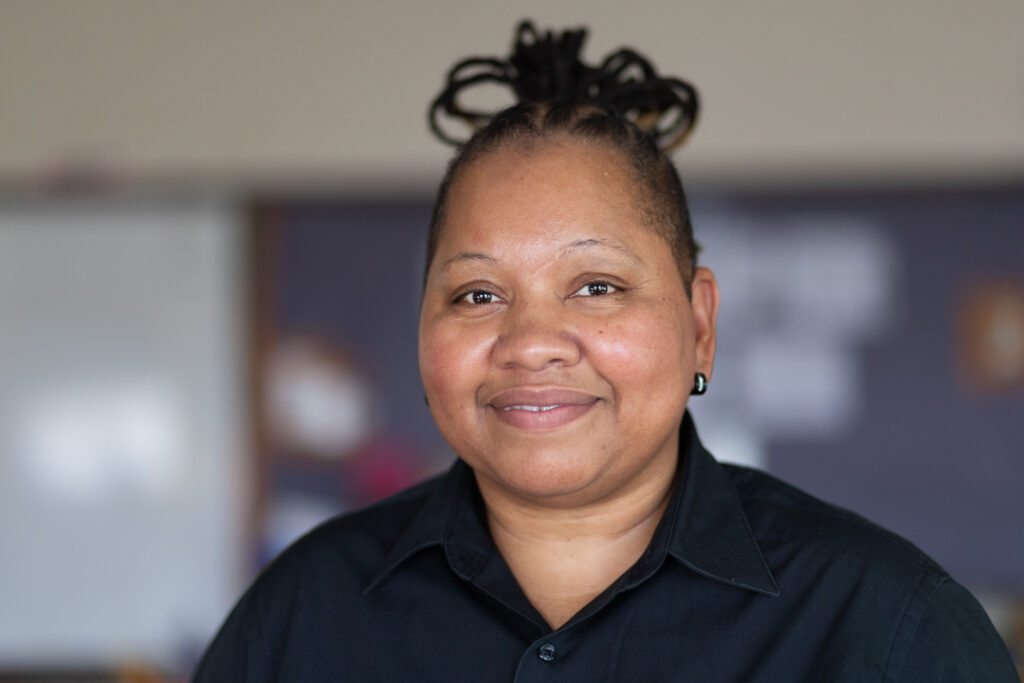
Thankfully, I co-parent with my ex-wife. We have a daughter together. When COVID started, she was nine.
Going through COVID, the kids were nervous. And then we watched George Floyd get killed on TV. The families were scared. And I received a message from the teacher saying she’d wanted my daughter on Zoom with the math teacher, and she missed it. Now, we hadn’t heard anything from the teacher the whole time during COVID. And my daughter is an A+ student. She accidentally missed this call that wasn’t a routine thing. We were sent a message that said, ‘If you all are not going to get her on Zoom, then let me know, because we have other kids that can use this.’
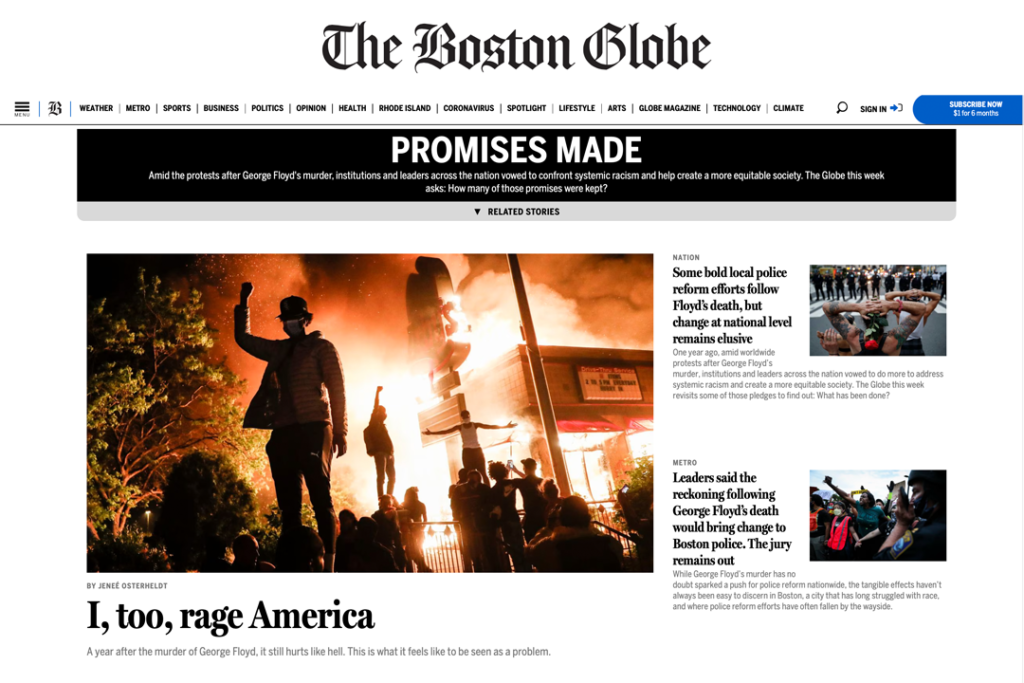
I was going through remote learning with my students. And I knew what my students’ parents were going through, what I was going through. If the parents didn’t communicate with me about an absence, I’d check in. I wasn’t making assumptions. So for me, as a parent, I had to call a meeting with that teacher.
I told her I didn’t appreciate that she had not reached out to say, ‘How has your family been impacted? I’m so sorry that you had to watch this.’ We’re an African American family. This was a white teacher. I said, ‘You haven’t reached out to us to find out what’s going on in our home. You haven’t communicated with us. Demí’s been online in class every day. She does all of her work.’ I’m working with her on writing, and it’s hard. She’s crying. There’s blood, sweat, and tears. And she’s also sad about what’s going on. I asked my daughter, ‘Did your teacher talk about anything?’ And she said, ‘No, we haven’t. I don’t feel like there’s space for that.’
As a teacher, I believe there needs to be space for it. Because if we leave the children to think their own thing, without being able to say what they’re feeling, that’s when the behaviors come up. That’s when mental health starts to get shaky. That’s when things go wrong. So as a teacher and as a parent, I said, ‘It’s not okay that your teacher is not bringing this up.’ We need to have conversations about what’s going on in our communities. So for my daughter, I needed her to see me address this.
The teacher apologized. She said, ‘Well, how did you do it?’ So I told her that it was all about building relationships from the beginning. So when all of this happened, I was checking in with my families.
My daughter always thinks that I’m gonna go off or something. She’d said, ‘Mom, please. You’re a teacher. You’re gonna go in too hard.’ But I told her, ‘I need you to see this modeled. You need to advocate for other people and for yourself.’
I need her to see that she has a bigger purpose in life. And even though you go to school to learn academics, as a human being, you have to treat people like human beings. You have to treat people with love. You love yourself first, and you be you. That’s what I want my daughter to learn.
–Tamika Fluker
Teacher at Mather Elementary School
Boston, Massachusetts
Share a link to this story
…or see Tamika’s posts on:
Wondering how you can support Tamika and her students? Visit Tamika’s DonorsChoose profile to find projects she’s fundraising for this year.
